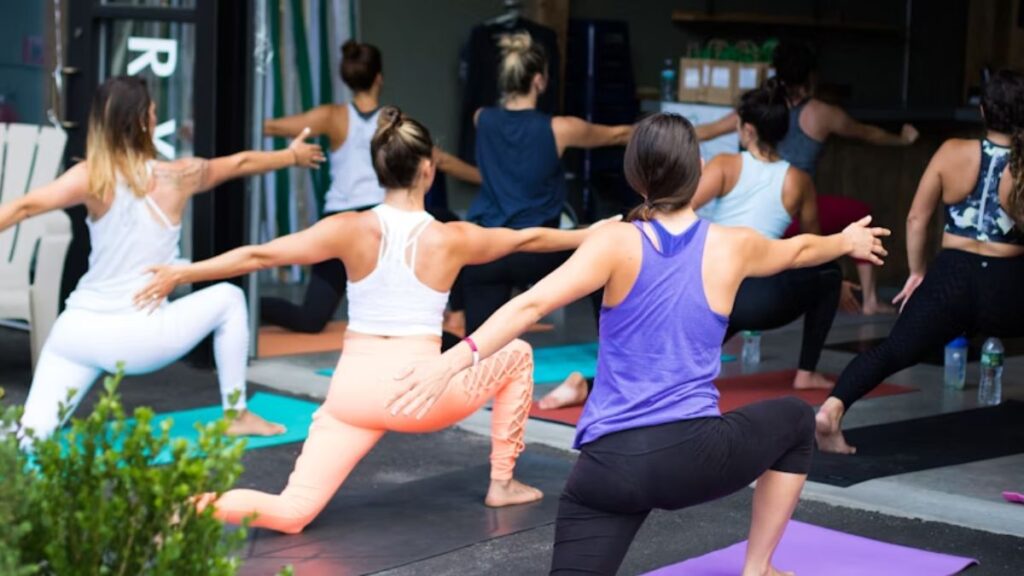Addiction recovery isn’t only about giving up substances. It’s about building a new life where the body, mind, and spirit feel alive again. For many, yoga has become a steady anchor in that process. The word “yuj” in Sanskrit means “union.” That’s what yoga is all about—bringing movement, breath, and mindfulness together in a way that restores balance.
Unlike treatments that focus only on the physical side, yoga goes deeper. It helps people reconnect with themselves and find peace in sobriety. But does it really help long-term recovery? Research suggests it can. From lowering cravings to easing stress, yoga is proving to be a simple but powerful tool for healing.
The Science Behind Yoga in Recovery
Addiction changes how the brain works. It disrupts areas that control pleasure, stress, focus, and self-control. That sounds discouraging—but here’s the good news: the brain can rebuild. Yoga helps with this by calming the nervous system and supporting healthy brain chemistry.
One study from Harvard Health found yoga raised levels of GABA. That’s a natural chemical in the brain linked to calmness and lower anxiety. Another study in the Journal of Alternative and Complementary Medicine showed yoga created deeper relaxation compared to control groups.
The NCCIH reports that most Americans who practice yoga feel less stressed and more balanced. Why does this matter in recovery? Stress, depression, and anxiety are some of the biggest triggers for relapse. By helping to lower these, yoga can act as more than exercise. For many, it’s a lifeline.
Reduces Cravings and Supports Withdrawal

Cravings and withdrawal can feel overwhelming in early recovery. Can yoga for addiction recovery help with that? Many find it does. By activating the parasympathetic nervous system—the body’s natural “rest and digest” mode—yoga helps calm racing thoughts. Breathing practices (pranayama) slow the heart rate and steady the mind.
Some studies suggest yoga lowers the intensity of withdrawal by balancing brain chemistry. Simple forms like restorative yoga or trauma-sensitive yoga are gentle enough for people in the early stages of sobriety.
Rebuilding the Body and Restoring Energy
Substance use often leaves the body drained. Fatigue, poor sleep, and weak immunity are common. Yoga helps repair some of that damage. Strength-building poses like Warrior or Tree rebuild stamina. Breathing exercises improve oxygen flow, which helps the body detox naturally.
Sleep also gets better with practice. Research shows yoga supports melatonin levels, the hormone that regulates sleep. Better rest leads to more energy for therapy, work, or family life. Isn’t that what recovery is really about—getting your life back?
Strengthening Mental Resilience
Recovery takes more than physical strength. It takes mental toughness too. Yoga builds this by teaching mindfulness. When you notice thoughts instead of reacting to them, you gain space. That pause is powerful. It helps you choose a healthy response instead of old habits.
Over time, yoga retrains how the brain reacts to stress. Instead of being caught in the same cycle of relapse, you gain tools to stay steady.
Holistic Addiction Treatment
Recovery works best when it treats the whole person. That’s why more programs now include yoga as part of holistic addiction treatment. This approach looks beyond abstinence. It adds compassion, self-awareness, and emotional healing.
Some of the biggest benefits of yoga in this setting include:
- Lowering stress hormones like cortisol.
- Releasing physical tension stored from trauma.
- Improving mood and emotional balance.
The best part? Yoga is accessible. You don’t need fancy gear. Just a mat, some quiet space, and a willingness to breathe.
Creating Healthy Coping Mechanisms
Why do so many people fall into addiction in the first place? Often, it’s unhealthy coping. Stress, anger, or sadness gets numbed instead of managed. Yoga helps swap those patterns for healthier ones.
Breathwork can calm nerves in tough moments. Movement channels stress into strength. Meditation provides a safe way to sit with emotions instead of avoiding them. Over time, yoga becomes more than a workout—it becomes a daily ritual of self-care.
Boosting Brain Function and Emotional Balance
Substances disrupt brain chemistry. That makes it harder to focus, regulate emotions, or make good choices. Yoga helps restore balance by increasing GABA, steadying dopamine, and supporting serotonin.
For those with PTSD or trauma, trauma-sensitive yoga offers even more benefits. Research suggests it can ease trauma symptoms while supporting sobriety. The result? Clearer thinking, more emotional balance, and better focus—all essential for long-term recovery.
Integrative Therapy for Addiction
Does yoga replace therapy? Not at all. But it can strengthen it. Many centers now offer yoga as part of integrative therapy for addiction. This means combining yoga with counseling, medical support, or group therapy.
Here’s how it helps:
- Yoga calms the body, making it easier to dive into therapy.
- Meditation pairs well with cognitive-behavioral therapy, reinforcing mindfulness.
- Breathwork offers an instant tool during anxious group sessions.
Yoga doesn’t compete with traditional treatments. It works with them.
Stress Relief and Emotional Regulation
Stress is one of the biggest relapse triggers. Can yoga reduce that risk? Research suggests it may help. By lowering cortisol and teaching the body to reset, yoga builds resilience. Simple stretches release physical tension. Meditation encourages patience and self-kindness.
With practice, people learn to handle tough emotions without turning to substances. That confidence is a game-changer in recovery.
Addiction Recovery Centers
More addiction recovery centers are adding yoga into their programs. Why? Because it works well alongside other therapies.
Many offer:
- Trauma-informed yoga for clients dealing with both addiction and trauma.
- Mindfulness-based relapse prevention.
- Group yoga to build connection and peer support.
In this setting, yoga reinforces sobriety as more than a goal. It becomes a way of life.
When choosing a yoga studio, consider atmosphere, style, and cost. A welcoming environment with options for all fitness levels, precise heat control, and affordable memberships makes practice accessible. Both beginners and experienced yogis can enjoy classes designed to fit their needs.
Meditation and Movement for Relapse Prevention
Relapse doesn’t usually happen in one moment. It builds through stress, disconnection, or loneliness. Yoga offers an early line of defense. Even five minutes of guided breathing can bring someone back to the present.
Gentle practices like restorative yoga or walking meditation rebuild trust in the body. This sense of safety can ease the emptiness that fuels relapse.
The Bigger Picture: A Lifestyle of Healing

Sobriety isn’t only about quitting—it’s about living again. Yoga supports this lifestyle by offering:
- A steady community.
- A daily self-care ritual.
- A path to spiritual or personal growth.
The National Health Interview Survey found that nearly 17% of American adults practice yoga. Many report less anxiety, better sleep, and improved well-being. For those in recovery, these benefits support resilience for the long haul.
Finding Strength in Recovery with Yoga
Yoga for addiction recovery is more than stretching. It’s a path toward balance, peace, and resilience. With breathwork, movement, and mindfulness, yoga gives you simple tools to handle stress, ease cravings, and reconnect with yourself. When added to holistic addiction treatment or integrative therapy for addiction, it serves as a strong partner. It doesn’t replace therapy—it supports it.
At Positive Sobriety Institute, recovery is not only about letting go. It’s also about what you gain—clarity, strength, and a renewed sense of self. Many in the Chicago, Illinois, area have seen how yoga, when blended with structured care, can help build lasting sobriety. Curious about how this works for you? Positive Sobriety Institute can guide your next step. Reach out today to begin a journey toward balance, healing, and steady recovery.


